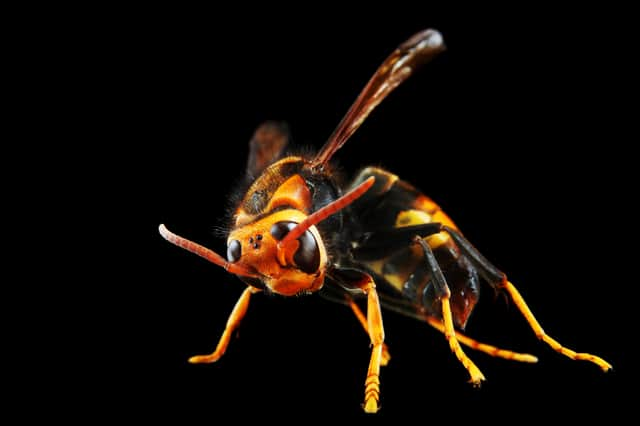Fears of a summer invasion of deadly Asian hornets after reports of UK sightings
This article contains affiliate links. We may earn a small commission on items purchased through this article, but that does not affect our editorial judgement.


What is believed to have been two large hornets have been spotted in the UK, sparking fears of a summer invasion.
The latest sightings in Devon comes after it was revealed that Alastair Christie, whose job is to tackle the spread of the hornets, reportedly spotted 80 queens in Jersey.
Advertisement
Hide AdAdvertisement
Hide AdSightings
The witness snapped a picture of the insect at the Arlington Court National Trust property.
Speaking to Devon Live, the witness said: “I was walking around the walled vegetable gardens when something huge flew past me.”
At first, the encounter left them unsure of what the creature was.
“At first I thought it was a hummingbird, it initially looked too big to be an insect,” they said.
Advertisement
Hide AdAdvertisement
Hide Ad“Its wingspan was enormous - a horrible, ugly looking thing.”
The picture of the hornet was later confirmed to be a large European hornet by the British Beekeepers Association.
This comes a few days after delivery driver Rob King claims to have seen a hornet in his car: “I noticed on my passenger window a huge hornet on the inside climbing up.”
He continued: “I dropped the window and it went out. After looking online I'm convinced it was a giant Asian hornet.”
Advertisement
Hide AdAdvertisement
Hide AdUrging people to be aware of the dangers the hornets carry, Mr King added: “People need to be made aware that these insects are now in North Devon and carry a potential risk of death.”
What makes these hornets dangerous?
The stinger of an Asian giant hornet is around 6mm long and has an especially powerful venom that can cause serious health issues.
A sting from the hornet can lead to anaphylactic shock as well as kidney failure.
If someone who is stung by the hornet is allergic to the venom, the risk of the sting being fatal greatly increases.
Advertisement
Hide AdAdvertisement
Hide AdA sting could also prove fatal for those who aren’t even allergic if they’re stung multiple times.
National Geographic reported that around 40 people die each year as a result of being stung by the giant hornets, usually as a result of an allergic reaction to the sting.
“Someone who is stung by the hornet and doesn’t receive proper treatment soon thereafter can die from the venom, which is powerful enough to disintegrate human flesh,” National Geographic wrote.
Masato Ono, an entomologist at Tamagawa University, near Tokyo, has felt the sting of the hornet and described the experience “like a hot nail through my leg.”
Advertisement
Hide AdAdvertisement
Hide AdThe insects are not just dangerous to humans, they also pose a threat to our ecosystem.
Dorset Beekeepers Association have warned: “The Asian Hornet eats many types of insects and those insects are the pollinators of our flowers.
“A serious invasion by the Asian Hornet could have a serious effect on our environment.”
How to spot an Asian hornet
The hornet is quite distinctive, so if you see something that matches the following description, you might have come across one:
Advertisement
Hide AdAdvertisement
Hide AdAlmost entirely dark abdomen, except for the fourth segment which is yellowBright yellow tips on their legs - our native hornets have dark tipsEntirely brown or black thorax whereas our native hornet is more orange in colourDark brown and velvety bodyWorkers can be up to 25mm in lengthMakes very large nests
What you should do if you think you see one
If you think you’ve come across an Asian hornet or even a nest, the key thing is not to engage with it.
The Great Britain Non-Native Species (NNSS) website issued a species alert for the Asian hornet, which said: “Do not under any circumstances disturb or provoke an active hornets’ nest.”
You should report your sighting to the NNSS - you can do this in a variety of ways:
Advertisement
Hide AdAdvertisement
Hide AdReport it using the Asian Hornet Watch app for your smartphone (download here for iPhone and here for Android)Report it using your computer with the online recording form hereYou can also email [email protected] with photographs and location details of your sighting
This article originally appeared on our sister site Edinburgh Evening News